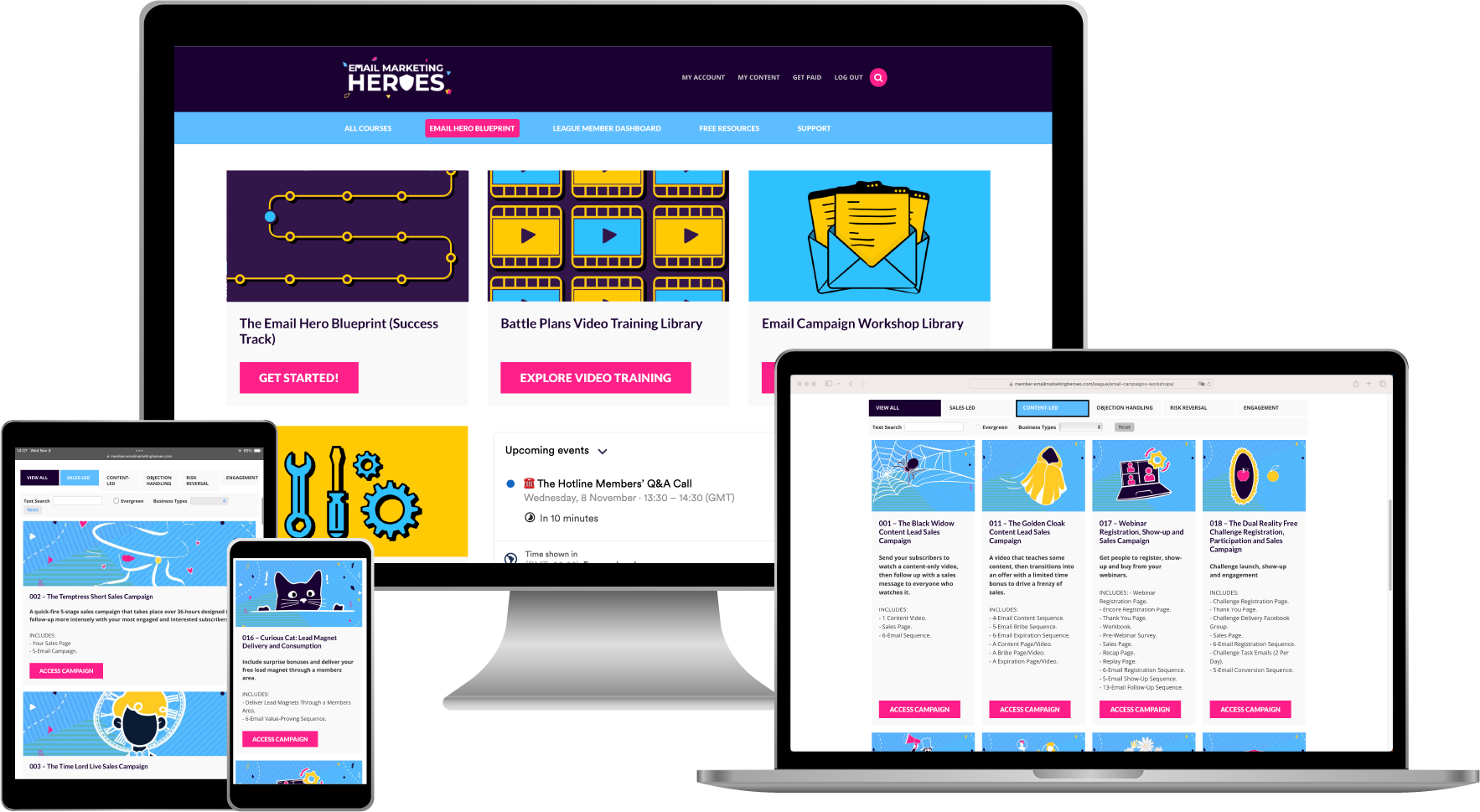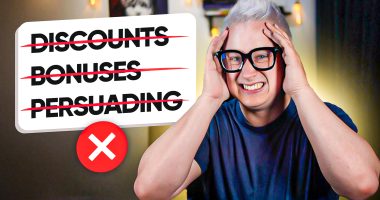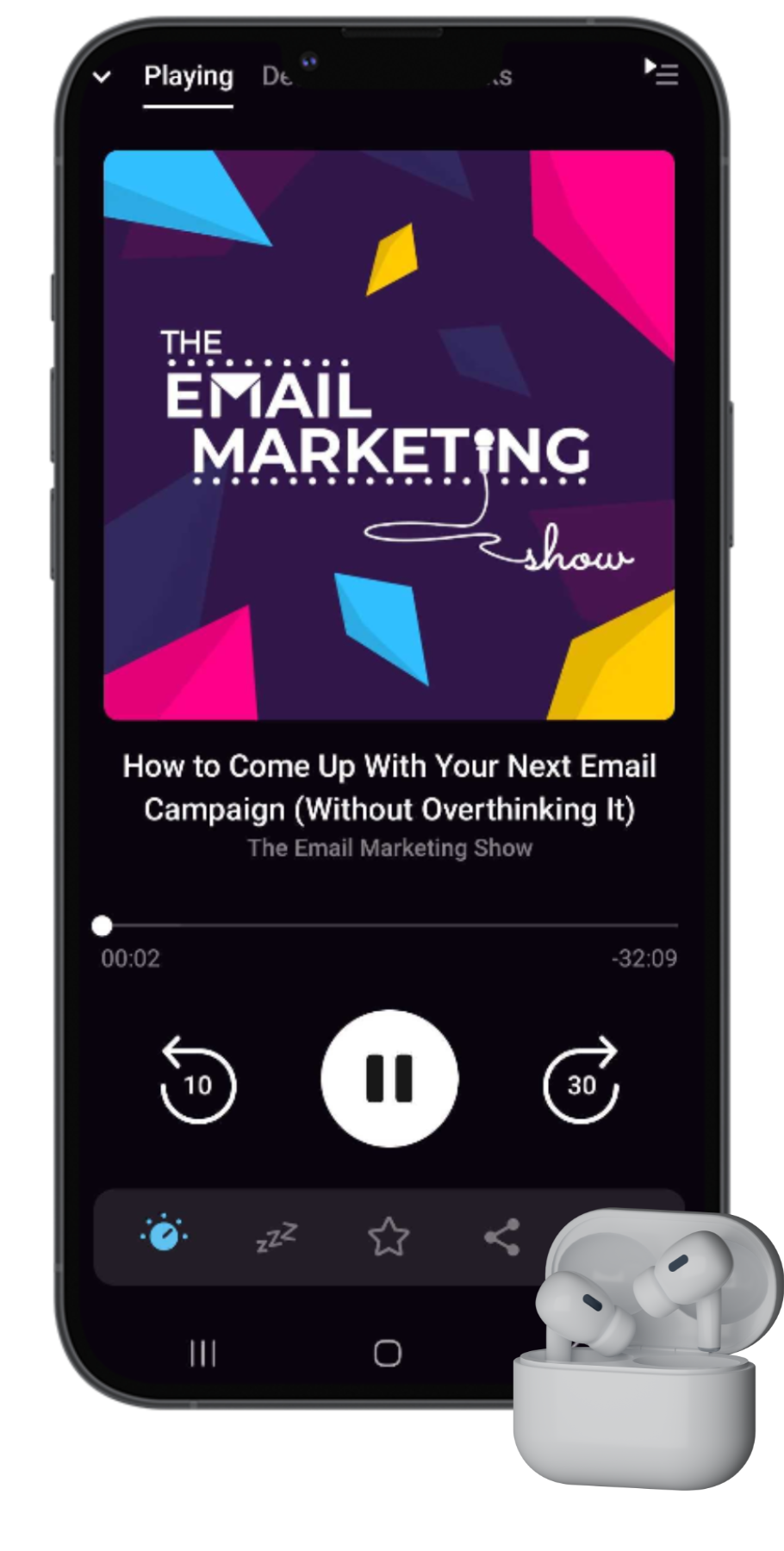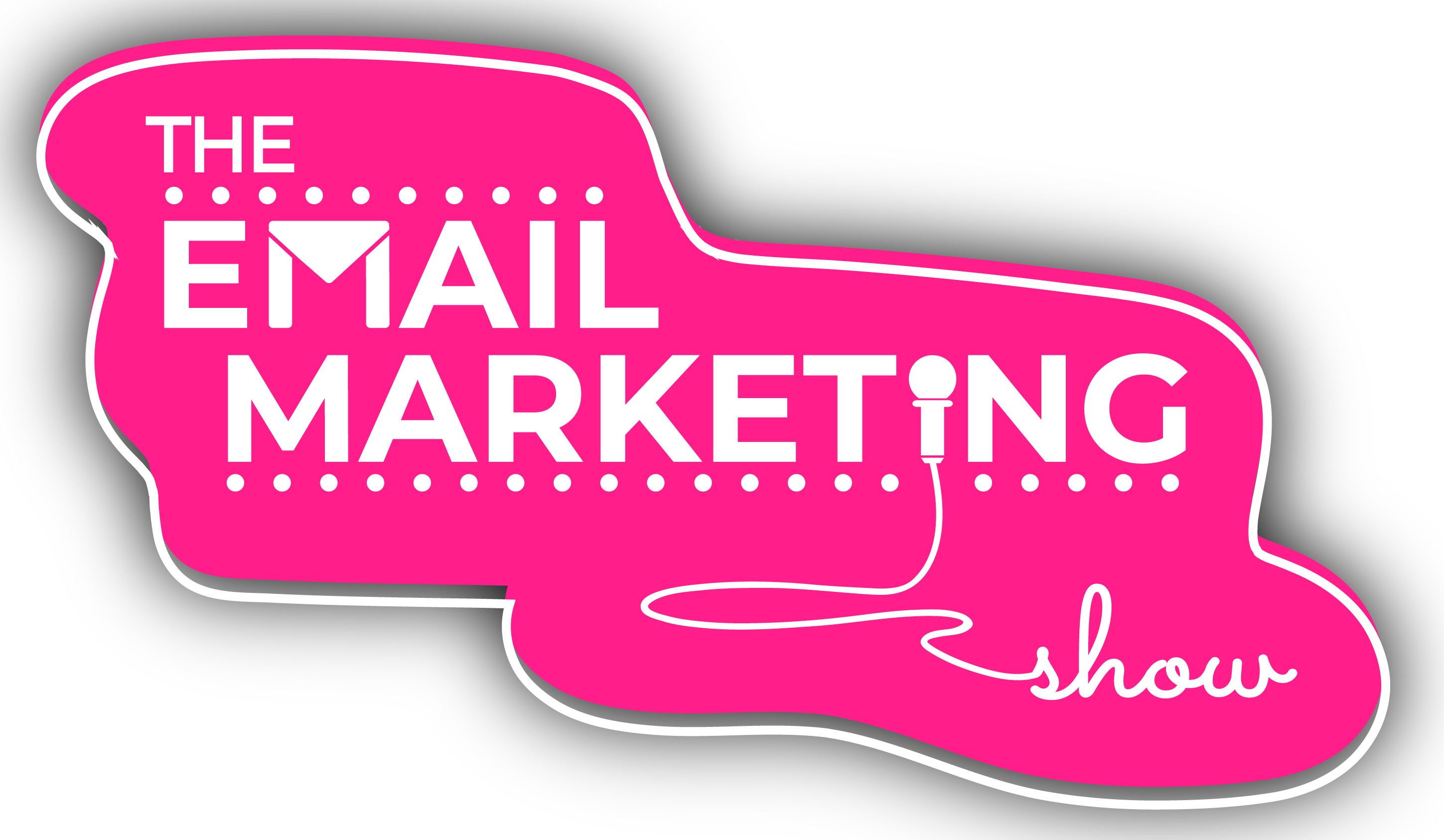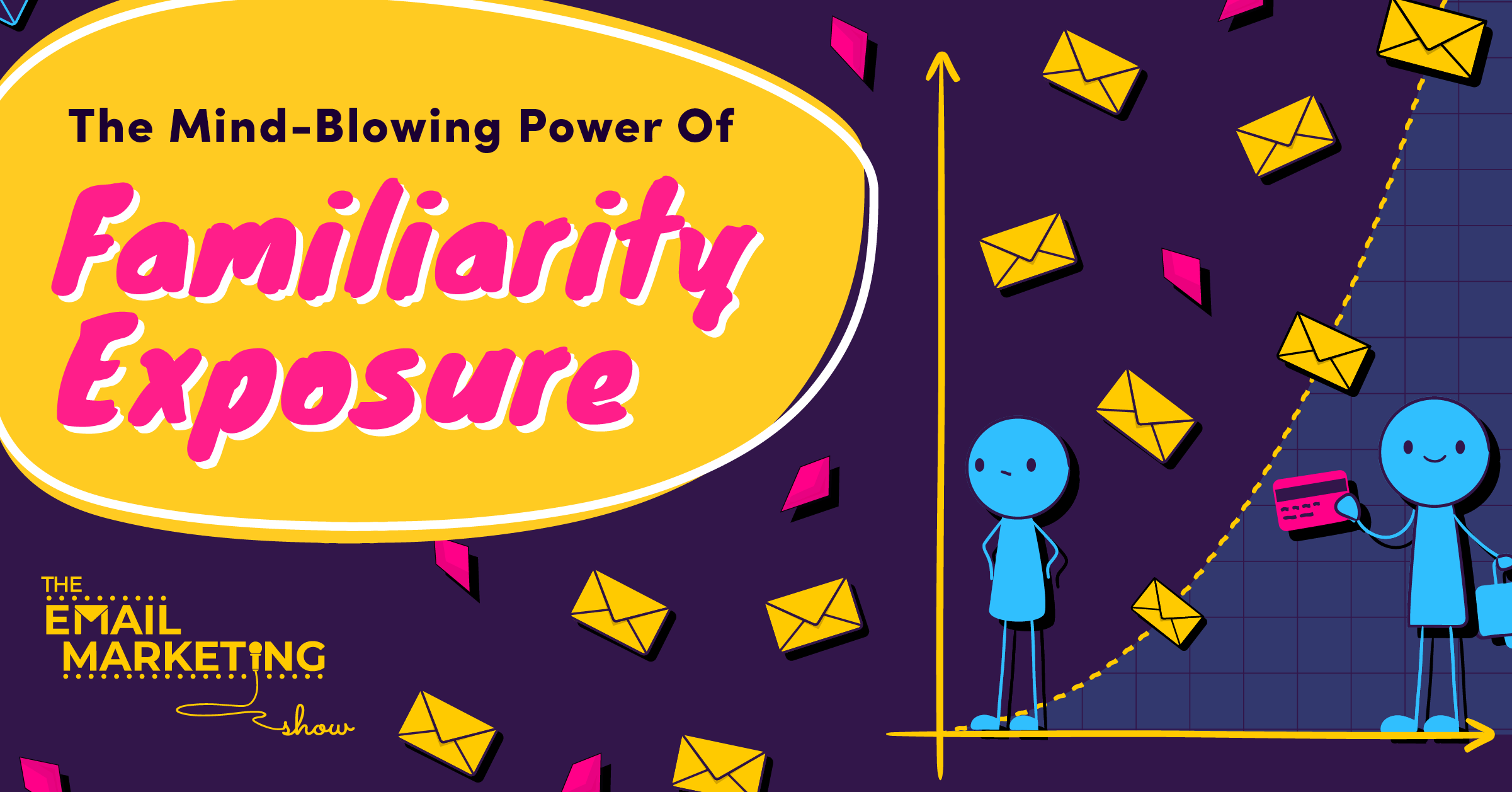
Tap Into The Mind-Blowing Power Of Familiarity Exposure Psychology In Your Emails To Boost Sales In Your Business
What is familiarity exposure? Also referred to as mere exposure, there's a whole stack of theories around how the psychology of familiarity in marketing works and can help you make more sales.
That's right. Become a ‘household brand', and more people will buy from you.
Want to know how it all works?
Let's find out.
SOME EPISODE HIGHLIGHTS: (0:19) Grab our amazing resource Click Tricks totally for FREE! (3:18) What is familiarity exposure? (10:45) Refer to things that your audience is familiar with. (14:45) Always build familiarity with you, your brand, and what you do. (21:19) How can you apply familiarity in your marketing? (23:10) Email marketing campaigns that use familiarity. (24:45) Don't make the mistake of offering discounts upfront! (27:08) How to start using familiarity in your email marketing right now. (29:11) Join The Email Hero Blueprint. (29:45) Subject line of the week.
What is familiarity exposure?
The idea is quite simple – we all understand it and have experience with it. Psychologically, you can increase the likelihood of people buying from you when something feels familiar to them. So if you feel like you've heard of something before, or know a particular name from somewhere (i.e. you have a feeling of vague familiarity), you’re more likely to buy.
That’s why people tend to buy household famous brands, even when they’re more expensive. For a lot of products, you could buy the cheaper equivalent, and it might taste, work, or be much the same. But we pick the branded product we know (even for a higher price) because we trust that familiarity.
It’s a bit like going to a restaurant and choosing a dish from the menu that you already know you’re going to like because you’ve had it before (either there or elsewhere). We like our home comforts. We like the feeling of something familiar and comfortable. It doesn’t matter how adventure-prone or how excitable you are (or aren't) – we all find it easier to choose something we’re familiar with. Because familiarity is comforting. And that's why familiarity is baked into pretty much everything we do – email marketing and more.
So how can you apply this concept of familiarity exposure in your marketing?
Refer to things that your audience is familiar with
One of the things you can do is to use references in your marketing that your audience is familiar with. For example, for a while, everyone was using famous GIFs from Friends or other popular shows. And it worked because people are familiar with that type of content. Using Friends' references is a safe bet with most demographics. Kennedy isn’t a big Friends fan, but if someone sent him an email with a sofa in the subject line and the word “Pivot”, he'd still get the reference. That subject line would come pre-loaded with a lot of content – whether you love Friends or hate it, you’d know what it's referring to. And you'd probably want to know what the email is about.
You won't be sending famous GIFs, memes, or references all the time, but if you email frequently and regularly, you have plenty of opportunities to do so. And when you use things in your marketing that feel familiar, you immediately activate the psychology that sits underneath your words.
Always build familiarity with you, your brand, and what you do
Another way to use this concept of familiarity is to build trust with your audience by exposing them to you and your brand. This is why celebrities can easily branch out into other products, such as perfumes or clothing ranges. Because we’re all familiar with their name and brand in the first place.
It's also why you have to show up regularly in people’s inboxes to build a relationship with your subscribers. It creates that sense of familiarity. When people think of us or what we do, for example, they probably expect it to be quite funny, cheeky, edgy, and a bit sweary, but also practical, and cut-through-the-bullshit. That’s our brand – it's what we’re all about. But if we showed up offering something super formal at a corporate event, that wouldn’t work as well for our brand.
This is why, when we launched our mastermind Level Up, a few years ago, we sold out two intakes without doing any marketing. We simply told people inside our audience that we were launching this mastermind, and it's all it took to sell it. Because the people who already know us and our style and like learning from us, already knew they’d have a great experience. They already trusted our brand and wanted to join in. And we were only able to do that because of this concept of familiarity.
How can you apply familiarity in your marketing?
One way to build this feeling of familiarity is to involve your subscribers in the creation or building process of your products or services. For example, if you're putting together a new programme, you could ask your audience to chip in and help you come up with a name for it. Or maybe they could vote on the logo or artwork for it. We did this for the original cover for our podcast, for example – we gave people a choice of two, so they'd tell us which one they preferred.
This works because when you then launch that product, people feel invested. They’re already familiar with it because they participated in the voting process by giving you their opinion. They've heard of your product, and they had something to do with it – whether it's creating, naming, or branding.
And if you don't want to go that far, you could simply ask your audience about their preferred time for a weekly coaching call, for example. If you can think of any decisions in your business that you wouldn't mind your audience getting involved in, jump on the opportunity and ask them.
Email marketing campaigns that use familiarity
Inside our programme, we teach email campaigns that use this familiarity principle. One of them is the Encore campaign, based on the idea that you show someone an offer, take it away, and then come back again with the same offer before you close the cart. When people on your list see the offer the second time (even if it’s months down the line), they experience a sense of familiarity that wasn’t there the first time (when it was potentially a cold offer). This time, they're more likely to buy it.
Likewise, in our Open Day campaign, we run a simple survey where we ask people a quick question. When they fill in the survey, they get into the mindset of thinking they quite enjoy the idea of being able to ask us a question so we can help them. And a few days later, we make them an offer to join one of our Q&A calls and ask us some questions. This triggers familiarity because we’ve already discussed this idea of asking us questions.
We use this concept of familiarity in all our email marketing campaigns. And that’s the beauty of them. We have these psychological principles baked into all our campaigns already so you don’t have to worry about figuring out how to do it yourself – you just follow the instructions. If you want to know more, we do run campaign workshops inside our programme, where we explain how everything works. But you don’t need to understand it to have it working for you – you can just follow the instructions, and implement the campaigns.
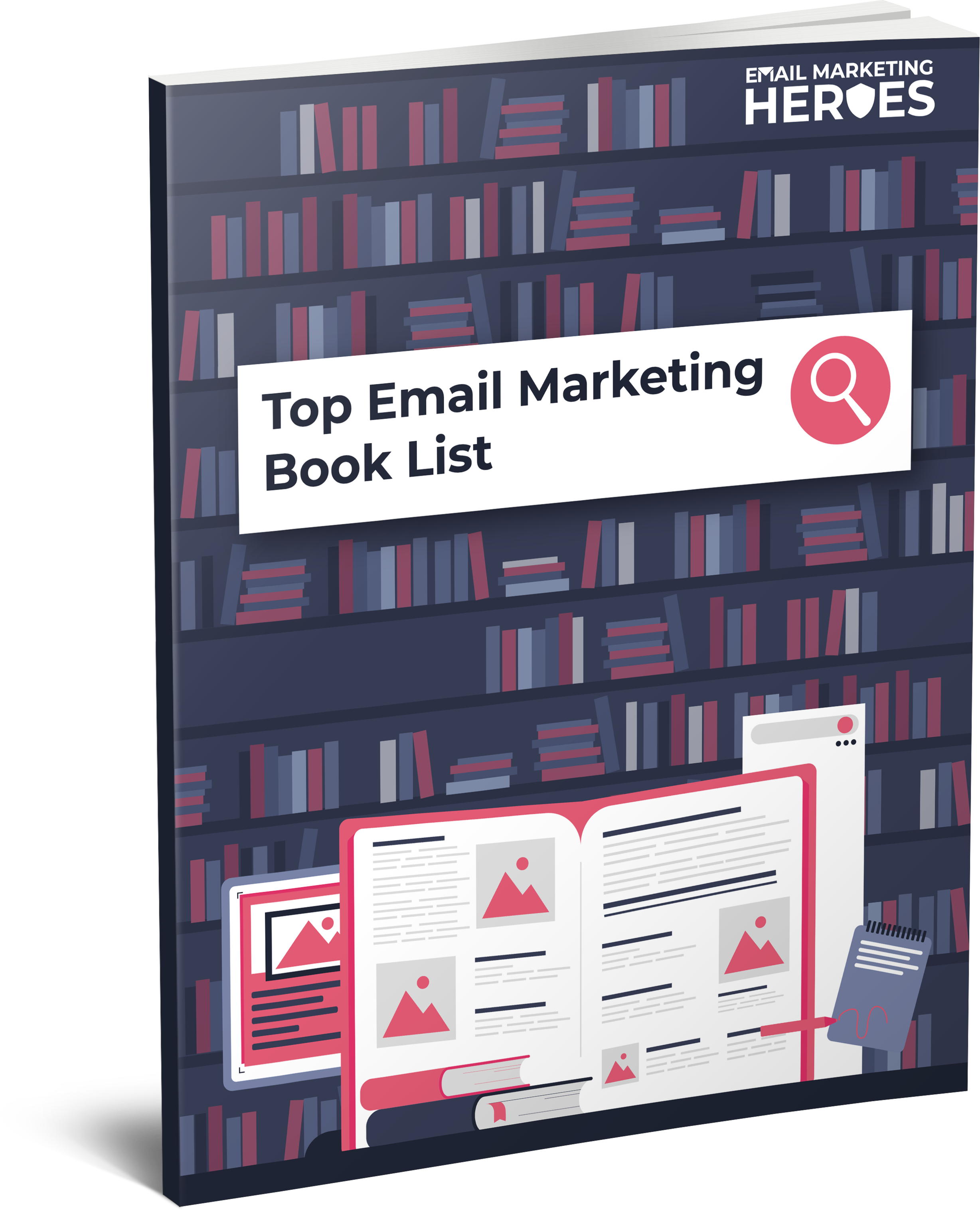
The Top 10 Books To 'Power Up' Your Email Marketing
10 book recommendations that will improve all areas of your email marketing (including some underground treasures that we stumbled upon which have been game-changing for us).
Don't make the mistake of offering discounts upfront!
A mistake we see a lot of marketers make is to offer discounts upfront. That doesn't work because you first need to legitimise the offer at full price. If you show up with a discount straight away, there's no familiarity. That's why, if you follow our teachings, you'll know that our SCORE email engine takes people through a sales campaign first and then a content-led sales campaign. You can add a bonus or a discount in the content-led campaign, and that tends to work very well. Why? Because you've built familiarity with the offer in the sales campaign just before.
Your subscribers trust that this is a discount because you just told them a few days earlier how much the full price was. So now they trust you’re truly giving a discount or adding a bonus because they know it wasn’t there before! You've just legitimised the discount or bonus by creating familiarity with your offer.
Also, remember that the more your audience continues to see your offers consistently, the more chances you have of them buying from you. Familiarity increases sales. And it's a bit like a spice – you can sprinkle it in everything you do and include it in all the communication you send out. The more you do it, the more natural it becomes.
How to start using familiarity in your email marketing right now
The first thing you can do right now to build familiarity with your audience is to show up consistently. If you’re absent from people's inboxes, they won't remember who you are – there's no familiarity there. We show up every single day – we’re consistent about that and never disappear. The key is for you to come up with an email-sending frequency you can keep up with and be consistent with it. Do whatever works for you, but stick with it.
The second thing you can do is to share personal stories. At the start of every podcast episode, for example, we share a personal insight. And we do the same in our emails – we're always talking about things that are personal to us. We do this because it breeds familiarity with us and allows us to take up more space in people's minds. We all have the same amount of space in someone’s email inbox – because an email is an email. But we can take up more space in people’s minds and show our subscribers that we’re more ‘real’ than other people. They get to understand us more. And when it comes to buying something that solves the problem you solve, people are more likely to buy from you because you’re the person who’s taken up more space inside of their minds.
Join The Email Hero Blueprint
If you’re a member of our programme already, you don’t even have to learn how to put this principle to work. You just need to know that it does work, and it’s already built into almost every single one of our email campaigns. If you want to check it out, it’s called The Email Hero Blueprint – it's everything you need for your email marketing!
Subject line of the week
This week’s subject line is “Shy bairns get nowt! (explained)”. This is a North-East colloquialism that means “if you don’t ask, you don’t get”. Rob cleverly put this expression together with the word “explained” in brackets because if you’re not familiar with the phrase, you may not understand what that means.
If that’s the case, you may just see a bunch of interesting words followed by the word “explained”, which suggests you’re going to find out what that’s all about. The words get your attention because you rarely see that sort of expression in what feels like a more ‘formal’ context, i.e. the subject line of an email.
Wherever you’re from, find something local or colloquial in your language and use those words in a subject line. Add the word “explained” (like we did), and see how that works for you. Check it out!
Useful Episode Resources
Related episodes
Template For Email Marketing Campaigns.
9 Psychological Things That We Use In All Of Our Campaigns.
How To Run A Smashing Flash Sale With One of The Best Email Marketing Campaigns In The World.
FREE list to improve your email marketing
If you want to write better emails, come up with better content, and move your readers to click and buy, here's how. We put together this list of our Top 10 most highly recommended books that will improve all areas of your email marketing (including some underground treasures that we happened upon, which have been game-changing for us). Grab your FREE list here.
Join our FREE Facebook group
If you want to chat about how you can maximise the value of your email list and make more money from every subscriber, we can help! We know your business is different, so come and hang out in our FREE Facebook group, the Email Marketing Show Community for Course Creators and Coaches. We share a lot of training and resources, and you can talk about what you're up to.
Try ResponseSuite for $1
This week's episode is sponsored by ResponseSuite.com, the survey quiz and application form tool that we created specifically for small businesses like you to integrate with your marketing systems to segment your subscribers and make more sales. Try it out for 14 days for just $1.
Join The Email Hero Blueprint
Not sick of us yet? If you're a course creator, membership site owner, coach, author, or expert and want to learn all about our ethical psychology-based email marketing that turns 60-80% more of your newsletter subscribers into customers (within 60 days), The Email Hero Blueprint is for you.
This is hands down the most predictable, plug-and-play way to double your earnings per email subscriber. It allows you to generate a consistent flow of sales without having to launch another product, service, or offer. Best news yet? You won't have to rely on copywriting, slimy persuasion, NLP, or ‘better' subject lines. And you can apply everything we talk about in this show.
Subscribe and review The Email Marketing Show podcast
Thanks so much for tuning into the podcast! If you enjoyed this episode (all about familiarity exposure and how to use it in your marketing to make more sales) and love the show, we'd really appreciate you subscribing and leaving us a review of the show on your favourite podcast player.
Not only does it let us know you're out there listening, but your feedback helps us to keep creating the most useful episodes so more awesome people like you can discover the podcast.
And please do tell us! If you don't spend time on email marketing, what do you really fill your working days with? We'd love to know!

